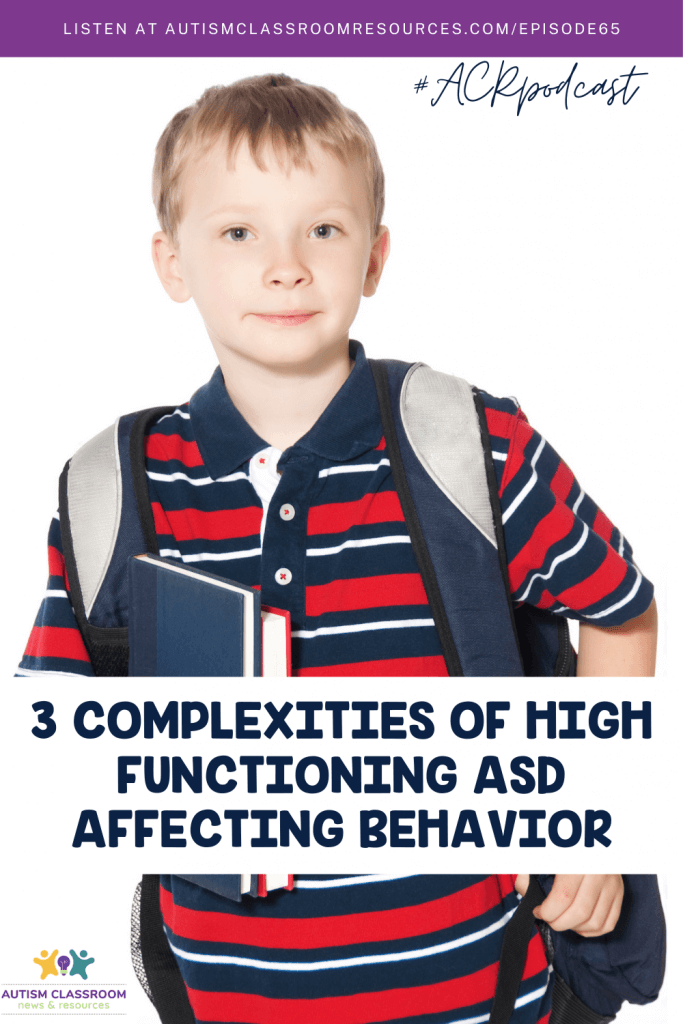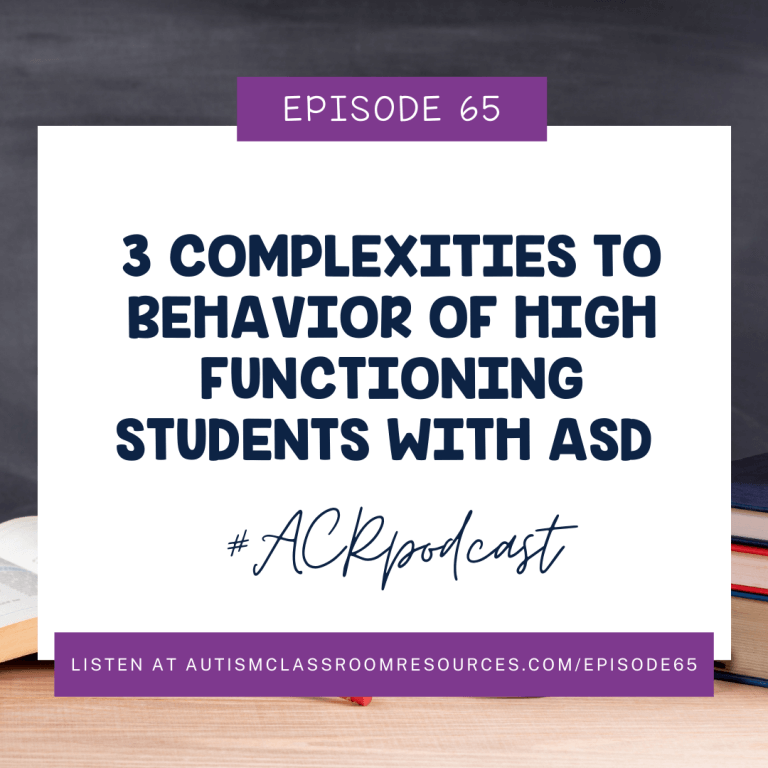Welcome back to the Autism Classroom Resources Podcast. I’m Christine Reeve, and I’m your host. In our last episode I kicked off a series on students with high functioning ASD. We sometimes refer to them as having high functioning ASD and I talked a bit about some of the issues with labels for this group of students. But typically they are students who range from average to gifted in cognitive abilities. However, they still can present their teachers with a wide variety of challenges. And they struggle with a number of challenges in their learning.
As we move into this series, I’m talking about some of those challenges. I’m a strong believer in the idea that you have to understand the problem before you can solve it. I was raised on functional behavior assessment after all. You have to know why behaviors are happening in order to address them. It’s the same to me with any issue.
Highlights of Behavioral Complexities in High Functioning ASD
So, in today’s episode, I’m going to talk about some of the complexities that these students present in their behavior. Let me be clear, I have a full day of training that is about the behavioral characteristics of individuals on the spectrum. And I’m pretty sure you don’t have all day, hence not what I’m covering here.
Instead, I’m going to focus on the why of these behavioral challenges–where they come from. Because when you understand the challenges that face students with ASD, it sometimes becomes a little clearer that behaviors that look like one thing (say defiance or noncompliance) are really happening because of something else (difficulty understanding the direction or overwhelming anxiety).
So, I’ll include links in the blog post for this episode about how we determine the function of challenging behavior and plan out behavior support plans. Because the strategies we use to approach the behaviors are still the same. However, how we approach it for the higher functioning students is a bit more complex…because their behavior often has more layers and is more complex. You can find those links at below along with a link to our free webinar on preventing challenging behavior.
So let’s get started.
Why Are These Characteristics Important?
As I mentioned, today I want to focus on the types of characteristics that students with high functioning ASD present that can sometimes complicate our perception of their behavior. Over the years, I’ve worked with lots of these students and I’ve watched them frustrate their teachers to no end….and have no idea why their teachers are frustrated. These are students who are very bright and, as I mentioned in episode 64, sometimes their disability is invisible to their teachers. So their teachers are sometimes surprised when their behavior is significantly different from their peers without autism. And sometimes it presents a problem. At times it’s just a lack of understanding of perspective (on both sides) but other times it results in issues that can lead to disciplinary consequences that are very serious.
3 Characteristics of High Functioning ASD That Complicate Behavior
So in today’s episode I’m going to focus on 3 behavioral characteristics that particularly complicate the understanding of these students’ behavior and perplex their teachers, often their parents, and sometimes the students themselves.
#1 Understanding and Inferring Others Thoughts & Perspectives
The first characteristic I want to address is a big one for autism. It’s often referred to as Theory of Mind but it comes down to being able to infer the mental states of others. In other words, being able to intuit the knowledge, beliefs, and interests of those around you. Some of this is coded in our language and some in our nonverbla behavior. Some of it is social understanding and pragmatic communication. I’ll be back in future episodes to talk about communication and socialization because those also play big roles in this area of behavior. But for now, let’s just focus on understanding others’ thinking and how that affects behavior.
If I don’t understand that you are thinking about something different than I am, I’ll be really surprised when you have a different opinion than I do. And I will be surprised that you don’t have the same knowledge about something that I do…causing me to be frustrated that I have to communicate that knowledge to you.
A personal example
This happens regularly in my family with my sister with high functioning ASD who thinks we know everything she does and often doesn’t feel the need to tell us. So she calls to tell you she needs a ride and where she is. She doesn’t wait to see if you can come get her. My mother interpreted that behavior as my sister avoiding getting a no answer and demanding that you do what she wants. But really it was just that she thought since it was a priority for her it would be a priority for her. We have had to spend a good bit of time teaching her that her priorities aren’t always everyone else’s priorities.
This particular challenge leads to difficulties explaining their own behavior…not because they are being stubborn or afraid of getting in trouble. Although this is often how it is interpreted. Instead they can’t really tell you why they do something. It also makes understanding and explaining their own emotions difficult. We have some research just coming out that interpreting their own physical feelings is sometimes hard for individuals with autism. So just think about how much more difficult emotions would be.
Difficulty understanding others’ perspectives also obviously impacts the social interactions students have and leads to interactions that can sometimes turn negative. They misinterpret others’ actions. I’ve had students who interpret another student’s positive encouragement as negative. They thought that students who were slapping them on the back after a great play in a game were attacking them and bullying them.
Impact of Other Students Interpretations of Students with High Functioning ASD
Similarly, it leads to their own behavior that others are upset by. So Deandre has high functioning ASD and is amazing with computers. Keshan is struggling with computers. Deandre reaches over and takes Keshan’s keyboard and says, “Here, let me do it. You are screwing it up.” Deandre truly had no idea why Keshan was upset and thought he had been insulted. Deandre just thought he was being honest. In this case, think Sheldon of the Big Bang Theory for more ideas along these lines.
So clearly, the difficulty with perspective and intuition is an important one that plays a behind the scenes role in behavior that we may not always be aware of.
#2 Catastrophic Reactions to Trivial Things
The second behavioral complexity, that isn’t so apparent to us, but luckily isn’t quite as big an issue, is that individuals with autism often exhibit catastrophic reactions to trivial things. So, my sister can’t get her internet to work on her iPad and she calls in such a panic that I think her house is on fire. In reality, her iPad just needs to be rebooted. But the reaction in some instances could cause some students to throw their iPad out of frustration without us understanding the issue. We see the “trivial” thing as just that–trivial. But it really isn’t trivial to them. To them it feels like the end of the world.
The Absent Student
And for some students it can be something as simple as something in the classroom being moved. For one student, a whole day was ruined because a student was absent and this student just couldn’t handle that. It caused a full day meltdown. No amount of discipline or consequences was going to fix that…it became a longer term issue we had to work on to help him know how to cope with that type of situation. And I’ll get to those strategies in later episodes.
#3 Anxiety & Depression / Mental Health
And finally, individuals with high functioning ASD are much more likely to struggle with anxiety and depression than their peers. In fact one study found depression was 4 times more likely for individuals with ASD than their peers. Those factors play a role in their challenging behavior as well. And when you factor in their difficulty with perspective and being able to describe their own emotions, it’s that much more complex.
This means that they are struggling with very real mental health issues that are impacting their behavior on a daily basis. But they aren’t able to describe it. We know that their typical peers who have these issues have significant difficulty, particularly in adolescence, sharing this with adults. Now imagine how much harder it would be if they didn’t understand how to explain what they were feeling. We need to be screening our students for these issues and consider them as we evaluate challenging behaviors like lack of motivation, difficulty getting work done and other more passive challenging behaviors.
I see many of these behaviors manifest themselves in high school, but I think many of them are present much earlier, but we aren’t as aware of them because they aren’t causing as many issues. We write them off as noncompliance or lack of motivation.
I will link to a couple of posts I have about addressing anxiety on the blog with some resources that can help if you have a student you think is struggling with this.
Summing Up
Now, these certainly aren’t the only behavioral complexities that students with high functioning ASD demonstrate. But they are three areas that I see trip them up most frequently in the general education environment at schools. Often when the situation and emotions die down, it’s easier to see where the problem lies, but many times the consequences have already been dealt by that time.
I’ll be talking in the next few episodes about some specific areas that are related to behavior that we need to be teaching and addressing. And I’ll be sharing some strategies to do that.
Did you know we have a whole course on behavioral problem solving in the Special Educator Academy? It’s the place to be to find out everything you need to know to work with all types of students in special education, particularly with challenging behaviors and we’d love to have you try it out. You can get a 7-day free trial at specialeducatoracademy.com and see if it’s a good fit for you.
You can grab some links to get you started to learn more about working with students with anxiety and other areas as well as a transcript of this episode below. And I’d love to hear your thoughts about working with these types of students. If you are an educator, hop over to our free Facebook group at specialeducatorsconnection.com and share. In the meantime, I’ll be back next week with a new episode. Thanks for everything you do for your students.






